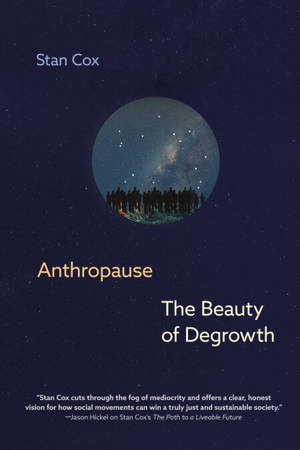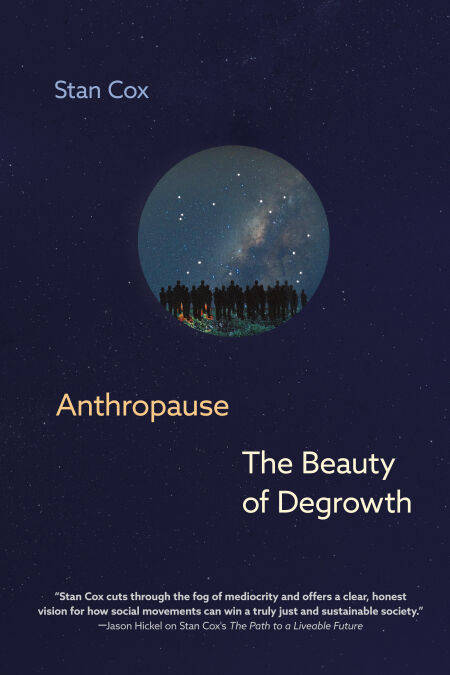
- Afhalen na 1 uur in een winkel met voorraad
- Gratis thuislevering in België vanaf € 30
- Ruim aanbod met 7 miljoen producten
- Afhalen na 1 uur in een winkel met voorraad
- Gratis thuislevering in België vanaf € 30
- Ruim aanbod met 7 miljoen producten
Zoeken
Omschrijving
A rallying cry to save the Earth with an “anthropause”—a term that can apply to any broad rollback of economic activity that gives nature room to recover and flourish.
“An iconoclast of the best kind, Stan Cox has an all-too-rare commitment to following arguments wherever they lead, however politically dangerous that turns out to be.” —Naomi Klein
In the spring of 2020, people worldwide found themselves confined at home in response to pandemic lockdown orders. Global carbon emissions suddenly plunged 8.8 percent. Air and noise pollution levels plummeted, and streams, rivers, and lakes noticeably became cleaner. Animal life quickly filled spaces that humans had deserted. Scientists documenting how quickly nature flourished in response to less human activity called the phenomena an “anthropause.” For a moment, humanity witnessed the beauty of degrowth.
In a world obsessed with getting and having more—more influence, more money, more fame, more stuff—the idea of degrowth seems counterintuitive. Yet, as environmental catastrophe becomes more widespread and severe, degrowth emerges as a necessary collective intervention to protect the living Earth—and civilization as we know it—from collapse.
In Anthropause, Stan Cox writes that by embracing degrowth, we are not turning our backs on progress. Instead, we are redefining it. We can produce enough goods to satisfy everyone’s needs, Cox argues, while liberating ourselves from ecocidal economies and the injustices they impose. This book lays out a clear vision of what we will gain and how as we embrace this revolutionary transition. We are seeing climate change happening all around us—2024 was the hottest year on record. Storms are stronger, droughts are longer, and wildfires are everywhere. As we approach the tipping point toward irreversible climate catastrophe, it’s clear that we must accept that endless expansion is destructive and reverse it through degrowth. Anthropause shows us how we and the living world will flourish if we succeed.
“An iconoclast of the best kind, Stan Cox has an all-too-rare commitment to following arguments wherever they lead, however politically dangerous that turns out to be.” —Naomi Klein
In the spring of 2020, people worldwide found themselves confined at home in response to pandemic lockdown orders. Global carbon emissions suddenly plunged 8.8 percent. Air and noise pollution levels plummeted, and streams, rivers, and lakes noticeably became cleaner. Animal life quickly filled spaces that humans had deserted. Scientists documenting how quickly nature flourished in response to less human activity called the phenomena an “anthropause.” For a moment, humanity witnessed the beauty of degrowth.
In a world obsessed with getting and having more—more influence, more money, more fame, more stuff—the idea of degrowth seems counterintuitive. Yet, as environmental catastrophe becomes more widespread and severe, degrowth emerges as a necessary collective intervention to protect the living Earth—and civilization as we know it—from collapse.
In Anthropause, Stan Cox writes that by embracing degrowth, we are not turning our backs on progress. Instead, we are redefining it. We can produce enough goods to satisfy everyone’s needs, Cox argues, while liberating ourselves from ecocidal economies and the injustices they impose. This book lays out a clear vision of what we will gain and how as we embrace this revolutionary transition. We are seeing climate change happening all around us—2024 was the hottest year on record. Storms are stronger, droughts are longer, and wildfires are everywhere. As we approach the tipping point toward irreversible climate catastrophe, it’s clear that we must accept that endless expansion is destructive and reverse it through degrowth. Anthropause shows us how we and the living world will flourish if we succeed.
Specificaties
Betrokkenen
- Auteur(s):
- Uitgeverij:
Inhoud
- Aantal bladzijden:
- 192
- Taal:
- Engels
Eigenschappen
- Productcode (EAN):
- 9781644215159
- Verschijningsdatum:
- 12/01/2026
- Uitvoering:
- E-book
- Beveiligd met:
- Adobe DRM
- Formaat:
- ePub

Alleen bij Standaard Boekhandel
+ 14 punten op je klantenkaart van Standaard Boekhandel
Beoordelingen
We publiceren alleen reviews die voldoen aan de voorwaarden voor reviews. Bekijk onze voorwaarden voor reviews.








